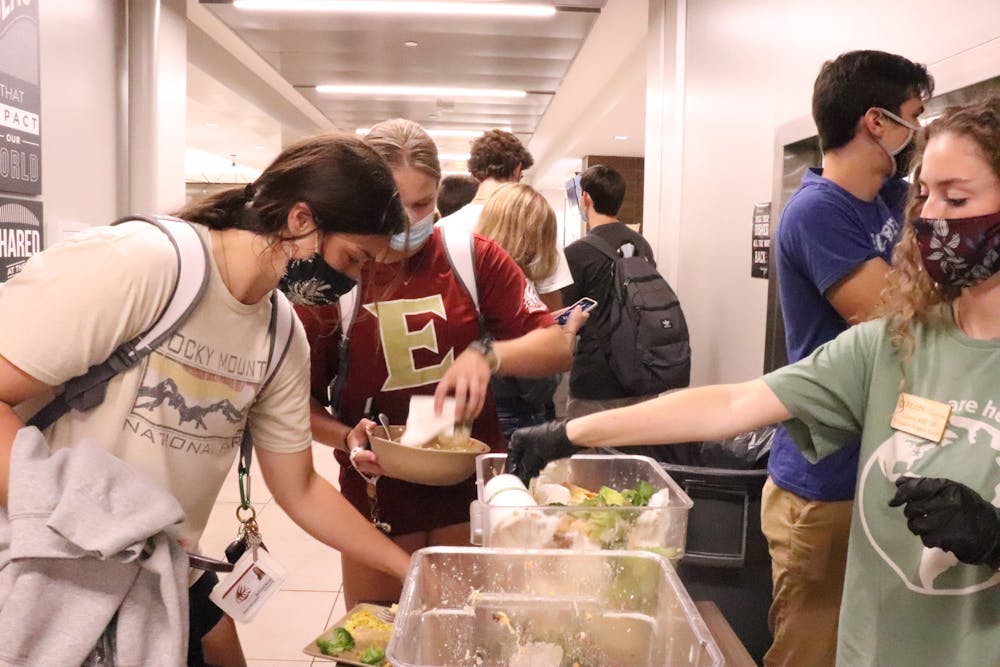Elon Dining’s green reusable to-go boxes are back, reviving the university’s efforts to become carbon neutral by 2037. During the 2020-21 academic year, reusable to-go boxes were replaced by single-use compostable containers due to concern over the spread of COVID-19 through high-touch and communal surfaces.
Student intern at the Office for Sustainability Lauren Hill is excited to bring back post-consumer composting as well as the reusable to-go boxes to limit the amount of waste she witnessed last year.
“Last year, Elon struggled to safely maintain their post-consumer composting program during the pandemic, ultimately prioritizing safety,” Hill wrote in an email to Elon News Network.
Elon Dining has been composting pre-consumer waste since 2008 and post-consumer waste since 2011, according to Kelly Harer, assistant director of sustainability for education and outreach. Elon Dining, Environmental Services and the Office of Sustainability collaborate to promote composting on campus.
Pre-consumer waste includes materials that never made it to the consumer, while post-consumer waste is trash that the consumer has used and is now disposing of. To-go boxes are an example of post-consumer waste.
According to Harer, Elon Dining was able to continue pre-consumer food waste composting during the pandemic, but not post-consumer. Casey Claflin, guest experiences manager at Elon Dining, wrote in an email to Elon News Network this halt was due to the staff shortage that occurred during the pandemic.
“During the pandemic, compost receptacles around campus became too contaminated with non-compostable materials, and our composting partner decided that, due to the volume of contaminated post-consumer waste and a short labor force, they could not effectively sort compostable materials from non-compostable materials,” Claflin wrote.
The Environmental Services team takes the compost from the various orange bins around campus, where it is collected by the third party service CompostNow, which takes Elon’s contributions to their facility in Goldston, NC.
Claflin wrote that last year the dining halls provided compostable silverware kits, cups, lids, and other containers due to the pause of using the reusable to-go boxes.
“Replacing single-use compostable to-go boxes with Green To-Go’s eliminates the resource and energy costs associated with processing tens of thousands of single-use containers annually and avoids the additional concern of improper disposal contributing to landfill waste,” Claflin wrote.
“We are thrilled, however, to be able to bring back reusable to-go containers, and mitigate the piles and piles of to-go boxes that were thrown away last year,” Hill wrote. “There are goals to bring back widespread composting throughout campus again, in addition to continuing composting in all the dining halls during food prep.”

Composting at the Community Garden and Loy Farm
The Community Garden and Loy Farm also take student compost, including food, newspapers and coffee grounds. They also receive yard waste from Environmental Services, including grass clippings, leaves, fallen tree limbs and more.
Professor of environmental studies and English Michael Strickland writes that the garden and farm limit their footprint by not using artificial fertilizers or fossil fuel machinery.
“The compost is brought back to campus to feed the flower beds and new shrubbery plantings around campus,” Strickland wrote in an email to Elon News Network. “That is a big operation, and not only saves the university a lot of money, but is also a very green, sustainable practice.”
Strickland said that while Elon Dining struggled to keep up with composting efforts, the garden and farm did not.
“While the dining hall waste part of the process (which is a big part of course) has been knocked offline because of Covid restrictions, the landscaping aspect of composting on campus has gone on without a hitch,” Strickland wrote.
Robyn Lane, manager of the Community Garden and Loy Farm, said that gardening has grown in popularity due to the pandemic.
“The garden is completely organic and utilizes all waste created,” Lane wrote in an email to Elon News Network. “The process is a multi-stage churning of locally composted food, weeds and old dirt. In short, we use a ‘lasagna method’ in which layers of dead brown materials, green live materials, and old soil compress and break down due to heat produced by microorganisms over time.”
Contributing to waste management
“A good saying to remember is, ‘When in doubt, throw it out,’ meaning if you aren’t sure of whether or not something is recyclable, compostable, or belongs in the landfill, it's actually better to put it in a landfill bin than risk contaminating the entire compost bin,” Harer wrote in an email to Elon News Network.
Hill said she values educating students about sustainability and enjoys spreading awareness of waste contribution to help Elon reach its goal of being carbon neutral by 2037. The full program is outlined in the Sustainability Master Plan.
Students can get involved with the Office of Sustainability to further the university’s sustainability efforts through volunteer programs, such as proper waste sorting and local clean-ups.
“Through all of our initiatives and events to get students on campus more involved in sustainability, we can help lower personal carbon footprints,” Hill wrote. “Increasing awareness and providing easy swaps and practices to decrease our personal carbon emissions, helps us take one more step forward towards carbon neutrality as a campus.”


